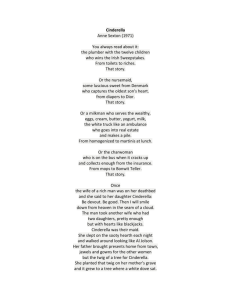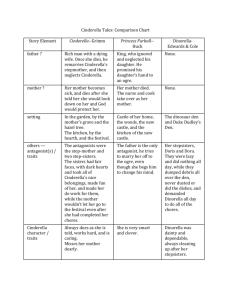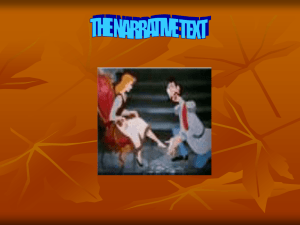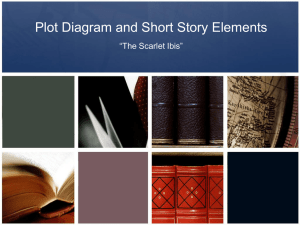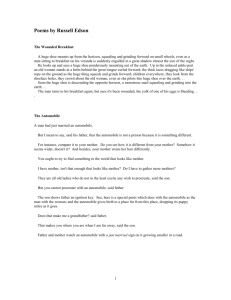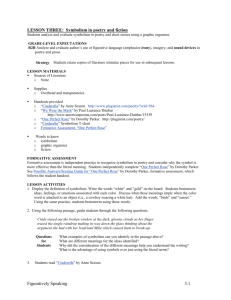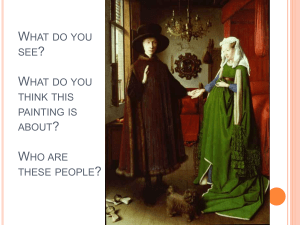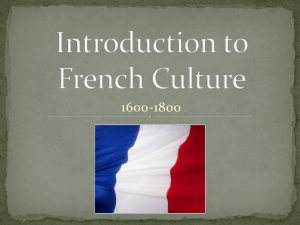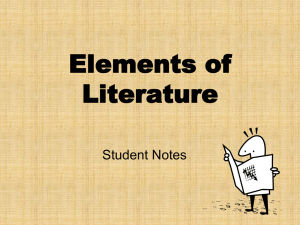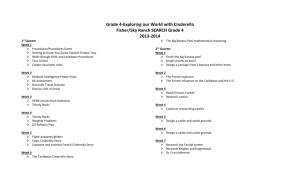Symbolism in literature
advertisement
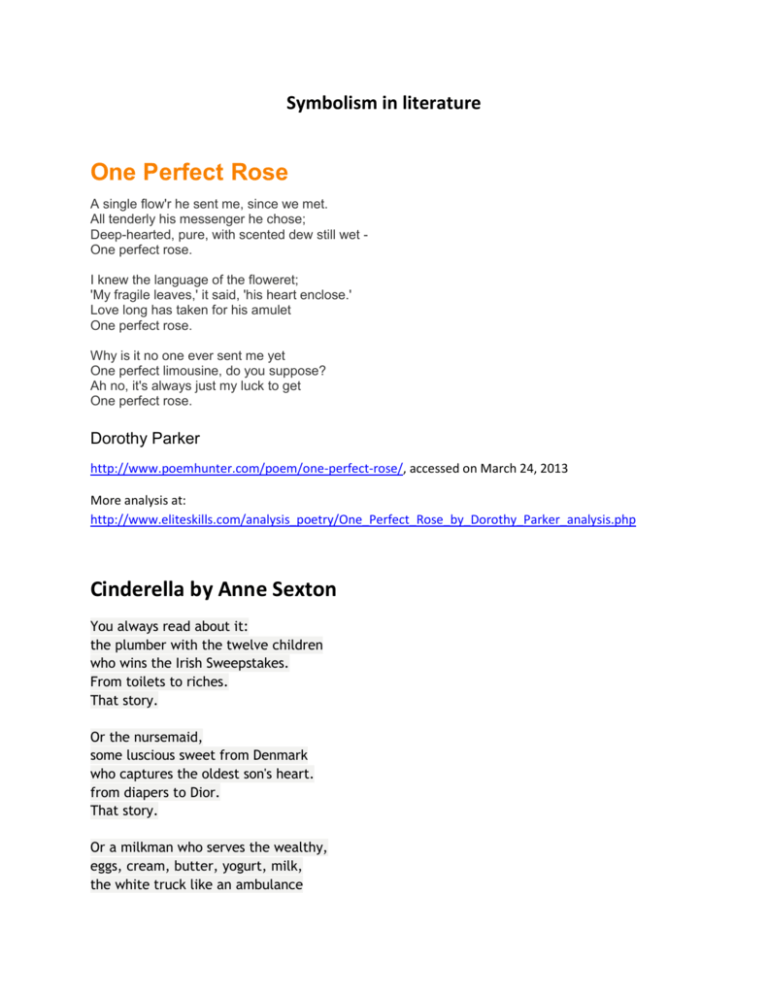
Symbolism in literature One Perfect Rose A single flow'r he sent me, since we met. All tenderly his messenger he chose; Deep-hearted, pure, with scented dew still wet One perfect rose. I knew the language of the floweret; 'My fragile leaves,' it said, 'his heart enclose.' Love long has taken for his amulet One perfect rose. Why is it no one ever sent me yet One perfect limousine, do you suppose? Ah no, it's always just my luck to get One perfect rose. Dorothy Parker http://www.poemhunter.com/poem/one-perfect-rose/, accessed on March 24, 2013 More analysis at: http://www.eliteskills.com/analysis_poetry/One_Perfect_Rose_by_Dorothy_Parker_analysis.php Cinderella by Anne Sexton You always read about it: the plumber with the twelve children who wins the Irish Sweepstakes. From toilets to riches. That story. Or the nursemaid, some luscious sweet from Denmark who captures the oldest son's heart. from diapers to Dior. That story. Or a milkman who serves the wealthy, eggs, cream, butter, yogurt, milk, the white truck like an ambulance who goes into real estate and makes a pile. From homogenized to martinis at lunch. Or the charwoman who is on the bus when it cracks up and collects enough from the insurance. From mops to Bonwit Teller. That story. Once the wife of a rich man was on her deathbed and she said to her daughter Cinderella: Be devout. Be good. Then I will smile down from heaven in the seam of a cloud. The man took another wife who had two daughters, pretty enough but with hearts like blackjacks. Cinderella was their maid. She slept on the sooty hearth each night and walked around looking like Al Jolson. Her father brought presents home from town, jewels and gowns for the other women but the twig of a tree for Cinderella. She planted that twig on her mother's grave and it grew to a tree where a white dove sat. Whenever she wished for anything the dove would drop it like an egg upon the ground. The bird is important, my dears, so heed him. Next came the ball, as you all know. It was a marriage market. The prince was looking for a wife. All but Cinderella were preparing and gussying up for the event. Cinderella begged to go too. Her stepmother threw a dish of lentils into the cinders and said: Pick them up in an hour and you shall go. The white dove brought all his friends; all the warm wings of the fatherland came, and picked up the lentils in a jiffy. No, Cinderella, said the stepmother, you have no clothes and cannot dance. 2 That's the way with stepmothers. Cinderella went to the tree at the grave and cried forth like a gospel singer: Mama! Mama! My turtledove, send me to the prince's ball! The bird dropped down a golden dress and delicate little slippers. Rather a large package for a simple bird. So she went. Which is no surprise. Her stepmother and sisters didn't recognize her without her cinder face and the prince took her hand on the spot and danced with no other the whole day. As nightfall came she thought she'd better get home. The prince walked her home and she disappeared into the pigeon house and although the prince took an axe and broke it open she was gone. Back to her cinders. These events repeated themselves for three days. However on the third day the prince covered the palace steps with cobbler's wax and Cinderella's gold shoe stuck upon it. Now he would find whom the shoe fit and find his strange dancing girl for keeps. He went to their house and the two sisters were delighted because they had lovely feet. The eldest went into a room to try the slipper on but her big toe got in the way so she simply sliced it off and put on the slipper. The prince rode away with her until the white dove told him to look at the blood pouring forth. That is the way with amputations. They just don't heal up like a wish. The other sister cut off her heel but the blood told as blood will. The prince was getting tired. He began to feel like a shoe salesman. But he gave it one last try. This time Cinderella fit into the shoe like a love letter into its envelope. At the wedding ceremony 3 the two sisters came to curry favor and the white dove pecked their eyes out. Two hollow spots were left like soup spoons. Cinderella and the prince lived, they say, happily ever after, like two dolls in a museum case never bothered by diapers or dust, never arguing over the timing of an egg, never telling the same story twice, never getting a middle-aged spread, their darling smiles pasted on for eternity. Regular Bobbsey Twins. That story. http://allpoetry.com/poem/8505487-Cinderella-by-Anne_Sexton, accessed on March 24, 2013 Review of "Cinderella" By Anne Sexton In Cinderella, Anne Sexton, using her sarcastic/ironic tone, exploits the popular Brothers Grimm fairytale to create a more realistically thematic, anti-rags-to-riches story. The first four stanzas of the narrative use repetition as a device to state her thesis that the myths of "That story," are just that, myths, and uses that justification to relate her own version of Cinderella, in a setting the speaker only relates to the reader as, "Once." However, what drives the poem is Sexton's use of irony and sarcasm throughout it, keeping the reader entertained and amused. Sexton's sarcastic tone relies on the use of simile, symbolism, and hyperbole to relate the anonymous narrator's feelings through constant interjections within the context. The subject, Cinderella, is represented as a, naïve, out of touch; spoiled brat. In the poem, the speaker relates that Cinderella sleeps on a "sooty hearth," and "walked around looking like Al Jolson" (32). At first, the reader might feel sorry for her, but the reality is that she made her bed by choosing to believe in fairytales instead of doing something to make her situation better, like washing her own face! At the end of the fifth stanza the speaker states, "The bird is important, my dears, so heed him" (40). The bird is a white dove, symbolic of Cinderella's deceased mother because it visits the tree that grew on her grave. The dove brings all kinds of gifts to Cinderella and "would drop it like an egg upon the ground" (39). This is important because of the inlaid connotations; the bird is a "him," and the egg represents fertility... or mother. Therefore, in a sense, is not the speaker telling the reader that in her fantasy world, Cinderella is forgetting where she came from in the first place. The dove came to the tree that grew on the mother's grave; the tree grew from the twig her father gave her. Cinderella only sees the gifts brought for the other women, and feels slighted, when she, in fact, had received the greatest gifts of all, her mother's spirit, and although estranged, her father's love. 4 Throughout the poem, the speaker interjects with commentary. Through this gives the opportunity to deliver personal opinion, which allows the reader to see another side of the story. So now, the reader has the story, his own interpretation, and the speakers view, leaving room for a variety of pictures. One of the most telling comments is the second line of the sixth stanza referring to the ball "It was a marriage market" (42). This metaphor takes the reader away from the story, and offers the narrators opinion of what these types of occasions represent in her mind. These interruptions compliment the tone of the story, personalizing it and helping to form a relationship between the reader and the speaker (the reference to the narrator as "her," is only due to the obvious feminine persona displayed throughout, as in the previously mentioned "my dears" in line 40). After the speakers personalized relation of the story, she presents the reader with an unexpected turn in the eighth stanza. Unlike the turn in other types of poems were it will resolve situations that lead up to it, the speaker resorts to a grotesque form of hyperbole in order to relate the expected happy-ending. To wit: the prince comes to find Cinderella, and the sister tries to take her place. The slipper does not fit, so she cuts off her toe. The prince is blind to the obvious spill of blood—or is he—and is ready to take her off to...wherever... until the dove tells him to look at all the blood. In other words, for this story's purpose; the prince wasn't looking at the feet. With this, the speaker feels compelled to add the curious comment that gives a deeper insight to her own perceptions on life; there is an obvious wound there which she felt the need to reveal at that time; "That's the way it is with amputations./They just don't heal up like you wish (86). Here the speaker creates a disassociation with the character in the story and seems to plead for sympathy herself. Eventually Cinderella gets to try on the shoe, and... At the wedding ceremony The two sisters came to curry favor And the white dove pecked their eyes out. Two hollow spots were left Like soup spoons (95-99) Cinderella creates a juxtaposition for interpretation, it is either "that story," or... if the shoe fits...wear it! http://joefriedman.hubpages.com/hub/Cinderella-By-Anne-Sexton, accessed on March 24, 2013 5 6
